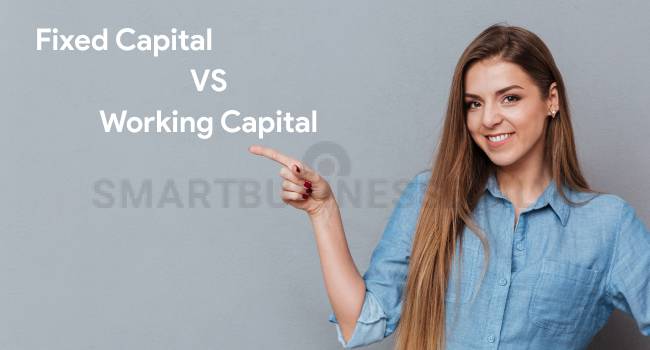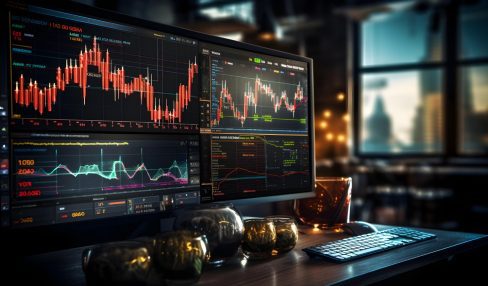Difference Between Fixed Capital And Working Capital – Best Comparisons
5 Mins Read
Published on: 14 January 2022
Last Updated on: 09 November 2024

toc impalement
What is the difference between fixed capital and working capital? Is this your question? If your answer is yes, then we have a solution for you.
Capitals are the building blocks of any farm, organization, or enterprise. A business/organization needs capital for initiating, running, and maintaining a business.
Fixed capital is usually the early investment that an organization makes to set up a business. The working capital, on the contrary, is the liquid asset required for running a business regularly, for instance, the daily meeting expenses and paying bills, etc.
In this article, we have discussed the difference between fixed capital and working capital. We have also defined fixed capital and working capital.
What Is Fixed Capital?

Fixed capital indicates the initial investment of any organization or firm during the establishment of that business. It is the primary asset needed to initiate a business. The fixed capital is usually an asset; it can be any property, equipment, facilities, or tools.
Here are some characteristics that define fixed capital-
- It must be a tangible or intangible long-term asset. Some fixed capital examples include- real estate, vehicles, and properties.
- Fixed capital is not easily turned into cash or liquidated. But it can always be reused and recycled by reselling.
- On the company’s accounting statement, the fixed capital usually depreciates over a long period.
What Is Working Capital?

Working capital determines the economic soundness, growth, and functioning in the working phase of an organization. It is the day-to-day expenditure that a company or an organization requires for running the business with ease and efficiency.
To make it more accurate, “Current asset – Current liabilities = Working capital.”
Here are some characteristics of the working capital that-
- Working capital is the difference between Current assets and current liabilities.
- The company’s working capital determines the current state of a company and how efficiently they are working. It also determines the short-term health of a company.
- The company’s working capital determines the growth and expansion of a company. Without working capital, it is difficult for a business to pay the bills and debt and increase profit.
Difference Between Fixed Capital And Working Capital

To differentiate between fixed capital and working capital, we had to help you understand what fixed capital and working capital are at first.
It would help if you had a heavy sum of fixed capital to ensure the long-term health of your business. But, the working capital is equally necessary for running and maintaining your business at all times.
Here is how we may distinguish between fixed capital and working capital-
- Fixed capital does not support a business directly, but working capital regularly supports the business.
- Fixed capital is a long-term investment. But the working capital is a current asset that ensures the growth and stability of a company.
- Fixed capital is required when the business is started. Working capital is required once the business is up and running.
- One cannot liquidate the fixed capital instantly and easily. On the other hand, the working capital is easily and instantly liquidated into cash.
- Fixed capital serves a business in the long term. Working capital works in the short term.
Many people mistake the difference between fixed and working capital for fixed and working capital. Here is a chart that will clarify the differences even better.
|
Base of Comparison |
Fixed Capital | Working Capital |
| Definition | Fixed capital is a long-term investment by a business to support a business in the long term. |
Working capital is for supporting a business on a daily or regular basis. |
|
Liquidity |
The fixed capital of a business is hard to liquidate. | The working capital of a business is very liquid. |
| Conversion | It cannot be converted into cash immediately. |
Working capital is very liquid, so it is easy to convert it into cash. |
|
Term |
It is a long-term asset. | The working capital of a business helps in the short term. |
| Objective | The objective of the Fixed capital is strategy-oriented. |
Working capital mainly focuses on operational objectives. |
|
Consumption |
There is no direct way of consumption for the fixed capital. | Working capital is generally consumption-based since a business needs the working capital to be fully operational. |
| Accounting period | Less than one |
More than one |
|
Depreciative |
Fixed capital depreciates in the long term. |
Working capital is for running operations and for consumption and serves in a brief period. So, it is not depreciative. |
Frequently Asked Questions (FAQ):
Here are some frequently asked questions and answers about fixed capital and working capital-
1. What Is The Difference Between Fixed Capital And Working Capital Class 9?
The general difference between fixed and working capital is that fixed capital is the investment done by a company to procure the fixed assets required for operating the business. On the other hand, fixed working capital is a regularly needed asset to finance the day-to-day operation.
Both of these capitals differ in how they operate to establish and operate a business.
2. What Is The Example Of Fixed Capital And Working Capital?
Fixed capital examples include purchasing any asset like- equipment, furniture, vehicle, machinery, industrial facility, property, land, etc. Working capital differs from fixed capital investment. It is more of regular expenditure. For instance, some working capital class 9 include- cash, inventory, account receivable, short-term debt payment, payable accounts, etc.
3. What Is The Difference Between Working Capital And Fixed Capital?
Working capital is the daily required expenditure or asset that operates a business soundly and healthily. It is responsible for maintaining business in the short term. The easy way to calculate the working capital is to subtract the current liabilities from the current assets.
Working capital differs from fixed capital in operating a business and its term of operation. The fixed capital works as a one-time, long-term investment; the working capital works to operate the business daily.
4. What Is The Difference Between Fixed Capital And Working Capital Brainly?
According to the difference given by brainly, fixed capital works like investment made in the manufacturing of goods and services; for example, legal documents, buildings, tools, insurance policies, etc.
On the other hand, the working capital is required to run daily operations. It includes paying short-term debt, money, raw materials, or machines.
Conclusion
Fixed capital and working capital differ in their nature and term of operation. This article offers a detailed description of fixed and working capital; also, it mentions the various characteristics of each of these capitals that distinguish them from each other.
We hope that this elaborate difference between fixed capital and working capital will help you understand the answer to your question better. In addition, we have also answered some of the frequently asked questions relating to the same topic.
Read Also:
- What Is The Difference Between Cost Accounting And Management Accounting?
- What Is The Difference Between Balance Of Trade And Balance Of Payment?
- Asset Sale Vs Stock Sale – Explanation Of Concepts And Key Differences
- Difference Between Capital Receipts And Revenue Receipts
- Difference Between Vat And Sales Tax – Best Comparisons


















Comments Are Closed For This Article